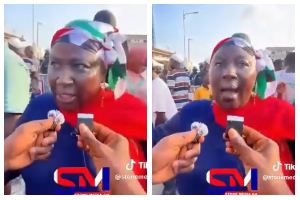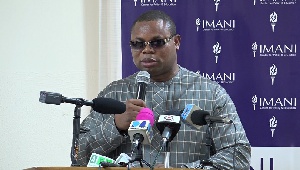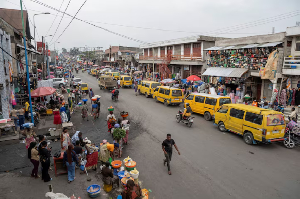“NPP Will Win 53%, International Research”. Flawed Conclusion Exposed.
By Kofi Ata, Cambridge, UK
The first part of the above title appeared on Ghanaweb and other Ghanaian media websites yesterday. After reading the news item on Ghanaweb, I googled DaMina Advisors, visited their website and downloaded a copy of the report, which is also available on Danquah Institute’s website. For reasons of time, I have read the just the twelve point summary, which provides the basis of the conclusion. I immediately identified a number of weaknesses or flaws in some of the points that are misleading and could have the different outome on the final conclusion. It is these weaknesses that I intent to share in this article, which I must confess I rushed into writing as I have not had time to read the whole of the eight-page report. However, I must add that my article is not to discredit the report because there are various points in the report that could be useful for NPP and NDC as well as Ghana as whole.
I did not come across the report methodology and there is no indication of the period when the research was conducted in Ghana but the report is dated August 17, 2012, an indication that the research was conducted in or before August but certainly before August 17, 2012.
The most conspicuous weakness I noticed was that if the research was conducted in August and the report written on August 17, 2012, was President John Dramani Mahama confirmed as the NDC Presidential candidate? Second, even assuming that he was the obvious but yet to be confirmed, had Vice-President Amissah-Arthur being nominated as the running mate of President Mahama? If the answers to any of the two questions is no, then the credibility and reliability of this report is weak because how could whoever conducted and wrote the research report have analysed events that had not taken place, but assumed they had occurred and draw conclusions let alone reliable and valid ones?
According the summary, “NDC party disunity and absence of key campaigner former President Rawlings to dent tough 2012 campaign”, is one of the reasons why NDC will lose the elections. This may be true. However, this is on the assumption that the NDC will remain disunited till the elections and that former President Rawlings will not campaign in the elections for NDC.
This suggests to me that the research was conducted and the report written before the NDC National Emergency Congress that confirmed President Mahama as the party’s Presidential candidate. I draw this conclusion because the presence of former President Rawlings at the congress was not factored into the research report. Since the congress, Rawlings is even reported to have predicted the possibility of NDC wining the Presidential elections. There are also indications that NDC may be making attempts behind the scenes to try and build a consensus and a united front for the December elections and therefore this point in the report is either outdated or no longer reliable.
The third weakness was, “Nomination of Muslim opposition vice president, in contrast to all-Christian NDC ticket to weaken traditional Muslim support for NDC”. In 2008, the same NPP Christian-Muslim versus NDC Christian-Christian tickets were on the Presidential ballot paper (unless someone is telling me that the late President Mills was not a Christian or since 2008 President Mahama has converted from Islam to Christianity). The question that should be asked is, did Dr Bawumia secure the Muslim votes in 2008 and if not what is the guarantee that it will be the case in 2012?
In fact, the difference in the Presidential tickets in 2012 is the fact that, one of the two former Vice-Presidential candidates from the north of the country on both sides in 2008 is now a Presidential candidate. This means that though religion may be a factor, the northern origin would be more important, especially for votes from the three northern regions. In fact and in my view, this could be to the advantage of the NDC in gaining the votes from the three regions since the argument could be, “a President from the north is preferable to a Vice- President from the north”. Again, did the Muslim Vice-President from the north under the last NPP administration have any significant improvement in the quality of lives of the voters in the three northern regions than the one under NDC administration and now President?
Four: “Key oil producing Western region to flip to NPP after generalized disappointment on oil revenues, jobs”. Though it is true that voters in Western region have been disappointed with a number issues on the oil production such as, not being granted a percentage from the oil revenue, lack of jobs for local people and the location of gas infrastructure development projects, the Chinese loan for gas infrastructure and other development projects in the region could be used by NDC to persuade the region to vote for the party. NDC could benefit politically from the region in the December elections since NPP MPs appeared to have opposed the loan in parliament.
Five: “2010 national census confirms pro-NPP Ashanti region as most populous region”. Has anything changed from 2008? The Asante region has always been the most populous region in Ghana and in fact, Nana Akufo Addo almost won the Presidency in 2008 by wining Asante and Eastern regions. This is also weak because the report failed to provide the comparative regional adult populations for 2008 and 2010 showing that Asante region has had higher than average percentage increase in its adult population than all the other regions, which could benefit NPP in 2012 more that in 2008. Since this is not done and again, there is an assumption that NDC may suffer from the absence of Rawlings in the campaign in their stronghold region (Volta), this reason could be unrelaible.
Six: “Swing Brong-Ahafo region to back Akan-ist NPP over now northern-led NDC”. Though, the fact that Nana Akufo Addo is a southerner and an Akan could determine some voting decisions across the Akan regions, this may not have considerable impact in said region (Brong-Ahafo) as the NDC’s General Secretary is from the region. After all, both NPP and NDC have Akans and Northerners on the tickets. In the same vein, it could be argued that Dr Bawumia could be President in the unlikely event of Nana Addo being incapacitated (may the Lord forbid). Again, when a northerner stood against an Akan in the 1979 Presidential elections, the Akan factor did not win the Brong Ahafo votes for the Akan candidate. In my view, this point is not strong enough to swing the region to NPP. Apart from that, consideration has not been given to any development projects undertaken in the region by NDC during the last four years. This reason makes NPP vulnerable to the allegation that it is an Akan party and not in the best interest of NPP and politics in Ghana. It is dangerous and I did not expect an international research organisation to use language that could encourage division in Ghana, bearing in mind the conflicts ethnicity and elections has caused in African.
Seven: “Victory by NPP will see reversal in country’s currency, fiscal, education and foreign policies..... Ghana’s currency, which has depreciated badly in recent months and which has precipitated a domestic shortage of forex will be re-stabilized by the new NPP government. The bourgeoisie petty trader and entrepreneurial base of the NPP, who dominate Ghana’s domestic forex sensitive commercial retail sector and who in recent months, have withdrawn their forex holdings from local banks, after a botched central bank attempt to stem the slide of the Cedi will return monies back to banks as a vote of confidence in a new NPP government”. In fact, this reason also exposes the NPP as the impression is created that some of its support base is deliberately sabotaging efforts to stabilize the value of the cedi.
“A new Central Bank Governor will be appointed who will have the clear mandate of stabilizing prices and the Cedi. Ghana currently has no substantive Central Bank Governor after former Governor Paa Kwesi Amissah Arthur was appointed Vice President following the sudden death of former President John Atta-Mills and the assumption of Vice President John Mahama to the presidency”. This erroneously assumed that former Bank of Ghana Governor, now Vice-President did not and the current Acting Governor does not have a clear mandate to stabilize prices and value of the cedi. Again, it is not accurate that the mere appointment of a substantive Governor with a clear mandate alone will stabilize prices and the value of the cedi because above all, these will depend on fiscal and monetary policies of the new government and such policies would take some time to have any positive effect. Last but not the least, these will also depend on external factors that may be beyond the control of Ghana, including the global economic conditions, the international money market, crude oil prices and the value of the dollar, etc.
“Oil production which over the past year had stagnated at around 70,000 barrels will be ramped up under pressure from the new government, bringing in much needed forex to stabilize the Cedi. As global oil prices fall in late 2012 and 2013, the new NPP government, under pressure from the public to get more oil revenues and desirous to close mounting external and budget deficits, may seek to alter the current tax and royalty regime to entice new players into Ghana’s new oil sector”. This is more speculative than reality and moreover, the lower than anticipated oil production in the Jubilee field is due to technical challenges than the lack of pressure from the NDC government. Unless such technical difficulties are resolved, no amount of pressure from or favourable foreign investment conditions created by a new NPP led administration could increase the production immediately or in the medium term. The expected fall in the global oil prices in 2013 is also not guaranteed.
For the above analysis, I am of the strong view that the conclusion that, NPP will win the December 2012 Presidential Elections by fifty three percent is very flawed and untenable. In fact, certain portions of the reports, especially on the basis of disunity within the NDC and NDC Vice-Presidential candidate suggest that sections of the research report were either fabricated or invented. How could research analysis from events that had not happened in Ghana at the time of the research, draw reliable and valid conclusions? I challenge the authors of the report to confirm when the research was undertaken in Ghana and when the report was written because they could not have known by or before August 17, 2012 that Amissah-Arthur would be Vice-Presidential candidate of NDC. This appears to be more of guess work than research work and it dents the robustness of the research work and the good image of the international organisation in question. I am in the UK here where DaMina Advisors, LLP has an office and it can challenge me for what I have written in the courts, if I am fundamentally wrong and they are right. I intend to send them a copy of this article.
Despite my misgivings, there are information in the report that may be of interest to both NPP and NDC and therefore they should take note and reflect on their campaign strategies. However, NPP members and supporters would be deceiving themselves to put their faith in this report because some of the reasons given for the conclusion are flawed. Ghana as a whole should not put much trust in this report because it’s a recipe for post election conflict in Ghana.
Kofi Ata, Cambridge, UK
Opinions of Thursday, 27 September 2012
Columnist: Ata, Kofi














